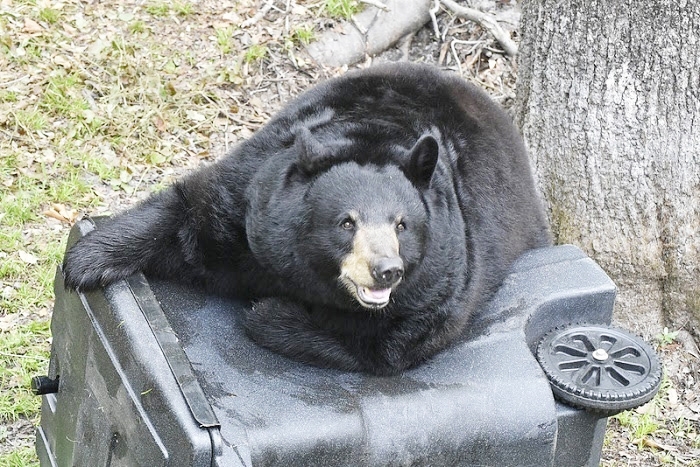Be BearWise this fall, secure garbage and other foods from bears
Summer is coming to an end, and bear activity is starting to increase. The Florida Fish and Wildlife Conservation Commission (FWC) reminds you to help protect both people and bears by securing garbage and other items that might attract these animals to your yard or neighborhood.
In the fall, Florida black bears begin preparing for the winter by consuming extra calories to pack on fat. During this time, bears require around 20,000 calories a day and will eat anything that’s convenient. Bears can sometimes obtain more calories in a shorter period of time from food found in a garbage can than by foraging for doof in the woods. You can reduce conflicts with these animals by securing your trash and other food attractants, such as birdfeeders and pet food.
To keep bears wild and away from your home, follow these tips:
•Secure household garbage in a sturdy shed, garage or a wildlife-resistant container.
•Put household garbage out on the morning of pickup rather than the night before.
•Secure commercial garbage in bear-resistant dumpsters.
•Protect gardens, bee yards, compost and livestock with electric fencing.
•Encourage your homeowner’s association or local government to institute ordinances to require trash be secured from bears.
•Feed pets indoors or bring the dishes in after feeding.
•Clean grills and store them in a secure place.
•Pick ripe fruit from trees and remove fallen fruit from the ground.
•Remove wildlife and bird feeders or make them bear-resistant.
Access “how-to” videos and information on securing attractants
from here: https://myfwc.com/wildlifehabitats/wildlife/bear/?redirect=bear
It is illegal in Florida to intentionally feed bears or leave out food or garbage that will attract bears and cause human-bear conflicts. If you see or suspect that someone is feeding or attracting bears, call the FWC’s Wildlife Alert Hotline at 1-888-404-FWCC (3922).
You can also help people and bears stay safe by remembering to watch for bears while driving. This time of year, bears are traveling across more roads in search of food, which results in more vehicle-bear collisions. The FWC advises drivers to be aware of their surroundings as they drive in bear country, especially around dusk and dawn, and when there is forest on both sides of the road. If you see a bear crossing sign, pay particular attention as this area has had frequent vehicle-bear collisions.
Top
In the fall, Florida black bears begin preparing for the winter by consuming extra calories to pack on fat. During this time, bears require around 20,000 calories a day and will eat anything that’s convenient. Bears can sometimes obtain more calories in a shorter period of time from food found in a garbage can than by foraging for doof in the woods. You can reduce conflicts with these animals by securing your trash and other food attractants, such as birdfeeders and pet food.
To keep bears wild and away from your home, follow these tips:
•Secure household garbage in a sturdy shed, garage or a wildlife-resistant container.
•Put household garbage out on the morning of pickup rather than the night before.
•Secure commercial garbage in bear-resistant dumpsters.
•Protect gardens, bee yards, compost and livestock with electric fencing.
•Encourage your homeowner’s association or local government to institute ordinances to require trash be secured from bears.
•Feed pets indoors or bring the dishes in after feeding.
•Clean grills and store them in a secure place.
•Pick ripe fruit from trees and remove fallen fruit from the ground.
•Remove wildlife and bird feeders or make them bear-resistant.
Access “how-to” videos and information on securing attractants
from here: https://myfwc.com/wildlifehabitats/wildlife/bear/?redirect=bear
It is illegal in Florida to intentionally feed bears or leave out food or garbage that will attract bears and cause human-bear conflicts. If you see or suspect that someone is feeding or attracting bears, call the FWC’s Wildlife Alert Hotline at 1-888-404-FWCC (3922).
You can also help people and bears stay safe by remembering to watch for bears while driving. This time of year, bears are traveling across more roads in search of food, which results in more vehicle-bear collisions. The FWC advises drivers to be aware of their surroundings as they drive in bear country, especially around dusk and dawn, and when there is forest on both sides of the road. If you see a bear crossing sign, pay particular attention as this area has had frequent vehicle-bear collisions.
